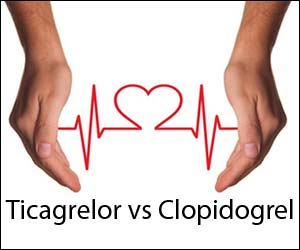- Home
- Editorial
- News
- Practice Guidelines
- Anesthesiology Guidelines
- Cancer Guidelines
- Cardiac Sciences Guidelines
- Critical Care Guidelines
- Dentistry Guidelines
- Dermatology Guidelines
- Diabetes and Endo Guidelines
- Diagnostics Guidelines
- ENT Guidelines
- Featured Practice Guidelines
- Gastroenterology Guidelines
- Geriatrics Guidelines
- Medicine Guidelines
- Nephrology Guidelines
- Neurosciences Guidelines
- Obs and Gynae Guidelines
- Ophthalmology Guidelines
- Orthopaedics Guidelines
- Paediatrics Guidelines
- Psychiatry Guidelines
- Pulmonology Guidelines
- Radiology Guidelines
- Surgery Guidelines
- Urology Guidelines
Ticagrelor noninferior to Clopidogrel after thrombolysis in under 75 patients with STEMI

Ticagrelor is a preferred choice over Clopidogrel for prevention Non-ST segment elevation acute coronary syndromes (Non-STE ACS) as per the 2014 AHA/ACC guidelines and it is thought to provide faster, greater, and more consistent P2Y12 inhibition than clopidogrel. A new TREAT trial has revealed that the administration of ticagrelor after thrombolysis(fibrinolytic therapy) did not significantly reduce the frequency of cardiovascular events when compared with clopidogrel in patients aged under 75 years with ST-elevation myocardial infarction (STEMI). The study was published in the Journal of American College of Cardiology.
Thrombolysis also known as Fibrinolytic therapy, is used to lyse acute blood clots by activating plasminogen, resulting in the formation of plasmin, which cleaves the fibrin cross-links causing thrombus breakdown. Although primary percutaneous coronary intervention (PCI) is an increasingly common treatment for ST-segment elevation myocardial infarction (STEMI), many STEMI patients continue to be treated with fibrinolytic therapy around the world.
Ticagrelor is a platelet aggregation inhibitor which reduces the rate of stent thrombosis in patients who have been stented for treatment of ACS. The efficacy of ticagrelor in the long-term post- (STEMI) treated with Thrombolysis (fibrinolytic therapy) remains uncertain.
To evaluate the efficacy of ticagrelor compared with clopidogrel in STEMI patients treated with fibrinolytic therapy, the authors conducted an international, multicenter, randomized, open-label with blinded endpoint adjudication trial that enrolled 3,799 patients aged less than 75 years with STEMI receiving Thrombolysis (fibrinolytic therapy). Patients were randomized to ticagrelor (180-mg loading dose, 90 mg twice daily thereafter) or clopidogrel (300-to-600-mg loading dose, 75 mg daily thereafter The key outcomes were cardiovascular mortality, myocardial infarction, or stroke, and the same composite outcome with the addition of severe recurrent ischemia, transient ischemic attack, or other arterial thrombotic events at 12 months.
Key findings of the study
- The combined outcome of cardiovascular mortality, myocardial infarction or stroke occurred in 129 of 1,913 patients receiving ticagrelor and in 137 of 1,886 patients receiving clopidogrel.
- The composite of cardiovascular mortality, myocardial infarction, stroke, severe recurrent ischemia, transient ischemic attack, or other arterial thrombotic events occurred in 153 of 1,913 patients treated with ticagrelor and in 171 of 1,886 patients receiving clopidogrel.
- The rates of major, fatal, and intracranial bleeding were similar between the ticagrelor and clopidogrel groups.
Based on the findings of the authors concluded that among patients less than 75 years of age who were treated with fibrinolysis for STEMI, delayed administration of ticagrelor was noninferior to clopidogrel. There was no excess of major bleeding, fatal bleeding, or intracranial bleeding with ticagrelor vs. clopidogrel. Ticagrelor represents a safe treatment option in such patients.
For further reference, click on the link

Disclaimer: This site is primarily intended for healthcare professionals. Any content/information on this website does not replace the advice of medical and/or health professionals and should not be construed as medical/diagnostic advice/endorsement or prescription. Use of this site is subject to our terms of use, privacy policy, advertisement policy. © 2020 Minerva Medical Treatment Pvt Ltd